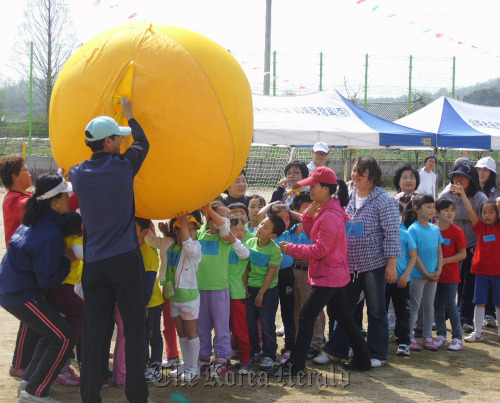
A 17-year-old boy who defected here from North Korea last year always wears his shoes indoors ― he never knows when he might have to run away.
Still suffering from the psychological trauma of his escape from the North, the boy, whose name is being withheld for his safety, failed to adapt to his first school here, being treated as an outcast by his South Korean classmates. He recently transferred to another school in Paju, Gyeonggi Province, a city located near the border with North Korea.
He is one of 1,681 defectors attending elementary or secondary school in South Korea. With the total number of defectors having reached 22,000, the number of young defectors arriving with one or both parents has risen almost fourfold from the 421 in 2005, according to data released by the Teen Defector Education Support Center. Of them, elementary school students make up the lion’s share with 1,020. The rest are high and middle school students.
In Seoul, some elementary schools have as many as 40 to 50 students from North Korea, and middle and high schools about one or two students, according to teachers.
“Student defectors attending public schools are not a rare thing any more. It will become a common sight in the near future,” said Kim Eun-young, his teacher at Dongpae Middle School in Paju.
But they struggle to adjust to the South Korean education system.
“They have difficulties because of the different vocabulary and accents from the South and years of a gap in studies, as well as failure to mingle with classmates due to cultural differences,” said Han Mann-gil, head of the TDESC, which is run by the Korean Educational Development Institute.
Although they get some basic orientation for studying at regular schools at the resettlement center Hanawon, where defectors learn about South Korean culture and the social and economic systems for three months, they still complain of difficulties in following the curriculum and getting acquainted with their classmates.
In order to help, teachers and schools try customized approaches to the students’ needs. Best practice is shared with other teachers and used as a model for programs for other student defectors in similar conditions, according to the center.
At the annual awards for best education practices for students from North Korea on Tuesday, 12 teachers and four schools were cited in the fields of study support, psychological and emotional support and improving South Korean students’ understanding of defectors.
The 17-year-old boy was lucky to meet an award-winning teacher. Now, he mixes well with his classmates and participates in class.
“I needed to make South Korean students understand that defectors have psychological trauma from years on the run and they speak differently and are a little shorter than them,” added Kim.
Song Hyun-ju of Sungcheon Elementary School in Daejeon teaches and takes care of a 10-year-old boy from 7 a.m. to 6 p.m., who arrived in South Korea with his mother in January this year.
Song gives him a Korean language lesson after school and lets him teach Chinese to his classmates, who are two years younger than him, to build up his self-confidence.
Han Hyung-seok a teacher at Saemal Elementary School in Uijeongbu, Gyeonggi Province has successfully raised the academic level of two girls from North Korea by helping them adjust through a customized study program and a variety of extracurricular activities.
KEDI school support director Han said: “If there’s one teacher who can understand and pay special attention to young defectors, they can adjust easily and smoothly to South Korean society.”
Behind the teachers’ efforts is the government investment in education for student defectors.
The Education Ministry has invested about 3.4 billion won ($3 million) this year in the teacher-student mentoring program, teacher training and study materials, said an education ministry official on condition of anonymity.
Aside from education focused on student defectors, another teacher stressed the importance of improving South Korean students’ understanding of them.
“Education that prepares students for the ultimate unification of South and North Korea should be based on the mutual understanding of the two sides. As a big difference exists between the two Koreas in light of culture and way of life, the differences may become a cause of verbal or physical abuse and conflict (after unification),” said Kim.
The potential conflict is palpable in Paju where residents and students feel hostile toward the North especially after the North Korean bombing of Yeonpyeongdo, Kim said.
“In order to prevent future conflicts, teachers should teach South Korean students to understand defectors and North Korea through continued training and research,” she added.
By Lee Woo-young (wylee@heraldcorp.com)


![[Herald Interview] 'Amid aging population, Korea to invite more young professionals from overseas'](http://res.heraldm.com/phpwas/restmb_idxmake.php?idx=644&simg=/content/image/2024/04/24/20240424050844_0.jpg&u=20240424200058)















![[Today’s K-pop] Kep1er to disband after 2 1/2 years: report](http://res.heraldm.com/phpwas/restmb_idxmake.php?idx=642&simg=/content/image/2024/04/25/20240425050792_0.jpg&u=)